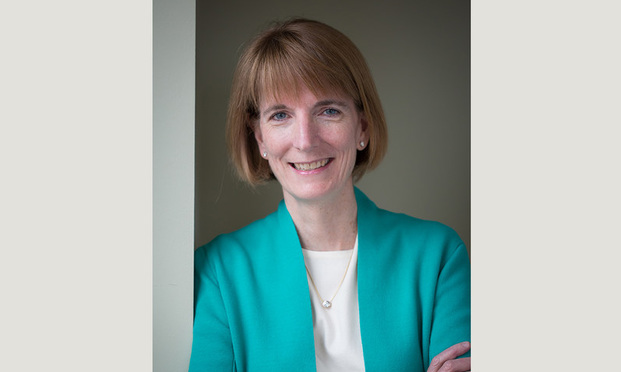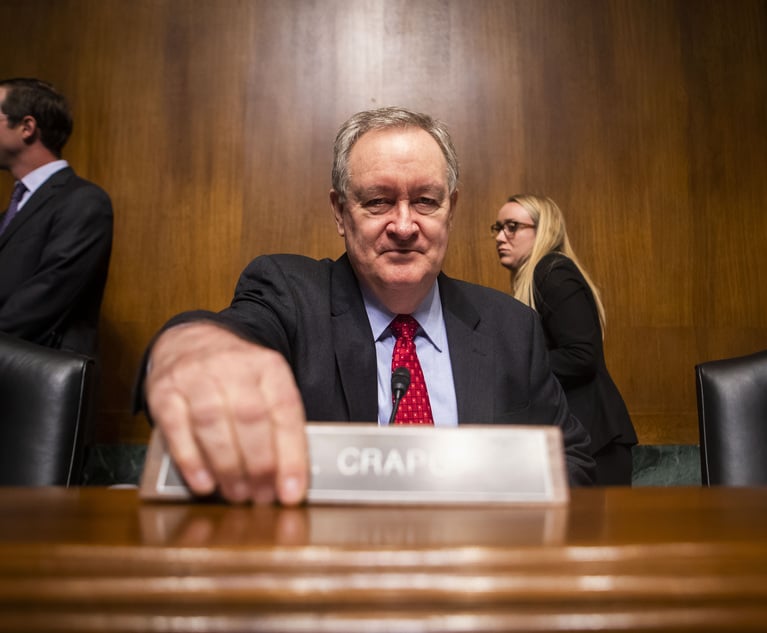Crowell's Dwyer to Head Leadership Council on Legal Diversity
The organization said its focus will broaden in 2020, looking more at how the legal industry as a whole can be more inclusive of diverse talent.
November 26, 2019 at 06:00 AM
5 minute read
The original version of this story was published on The American Lawyer
 Ellen Dwyer, incoming chair of the Leadership Council for Legal Diversity. Courtesy photo
Ellen Dwyer, incoming chair of the Leadership Council for Legal Diversity. Courtesy photo
The Leadership Council on Legal Diversity has named the leader of Crowell & Moring's executive committee as its new chair.
The group appointed Washington, D.C.-based Ellen Dwyer, who is also a member of Crowell's management board and partner in its labor and employment group, to take the organization's reins Jan. 1, 2020. Dwyer will succeed Laura Stein, executive vice president and general counsel for The Clorox Co., who led the organization for two years.
Kim Rivera, president of strategy and business management and chief legal officer for HP Inc., has been named LCLD's chair-elect.
Founded in 2009 to provide networking, career advancement and leadership opportunities to women and diverse attorneys, LCLD counts more than 300 law firm leaders and in-house counsel among its members.
In an interview, Dwyer said the group has directed its energy toward building relationships among lawyers and potential clients and mentors.
"This is really core and, to me, the foundation of all of our work—amazing programs we're very proud of, which provide tremendous opportunities for women and diverse lawyers," she said.
LCLD's original goal was to create 10,000 legal role models through various initiatives, including a fellowship program, which provides high-performing diverse attorneys with support to work toward leadership in their organizations; the Pathfinder program, which focuses on diverse, early-career attorneys' relationship-building, leadership skills and career development; the 1L Scholars Program, which gives students the opportunity to work closely with attorneys in LCLD member organizations; and the Success in Law School Mentoring program, which caters to diverse, first-year law students.
The target of 10,000 role models was reached this year in time for the organization's 10-year anniversary, Dwyer said, meaning that her role as LCLD chair will focus on more outward-reaching goals.
"Going forward, we need to to focus on the other side of the equation: what leaders of [LCLD's] member organizations are doing to rethink and further advance the career trajectories of diverse talent," she said. "Each individual [involved with LCLD] tries to ensure we're sharing best practice across our membership, so that others can take advantage of what we see as working."
Dwyer said that in her 20 years recruiting and developing talent at Crowell & Moring, she's seen the importance of not only recruiting, but also retaining diverse talent by increasing their opportunities to succeed.
"In my current role, chair of the executive committee, it's my job to retain the best talent," she said. "I've seen firsthand the power of ensuring that women lawyers and diverse lawyers in particular have the opportunity to develop relationships important to their career progression."
Crowell & Moring became involved with LCLD within a few years of the organization's founding and has been an active participant ever since. Dwyer said the organization does a great job of tracking which diversity initiatives are working, supporting members who want to implement changes in their firms, and scaling initiatives across the legal industry.
"We've actually seen the progression we're looking for, in terms of digging in and developing the potential [of diverse attorneys]," Dwyer said. "At Crowell & Moring, we've seen that too."
The law firm highlighted the experience of Chahira Solh, a former LCLD fellow who has risen through the ranks at Crowell & Moring. She is currently managing partner of the firm's Orange County, California, office.
In an email, Robert Grey Jr., LCLD's president, praised Dwyer's leadership both within her own firm and in the legal community as a whole.
"One reason that [Dwyer] has been so successful and respected in her career is that she understands the value of relationships," he wrote. "As a leader, she has always brought a deeply personal level of commitment to those with whom she works. That shows up, for example, in the way she views the sponsorship of diverse attorneys at her firm, and I have no doubt that same personal level of commitment will be a hallmark of her tenure as chair of LCLD."
Dwyer said she also wants to focus on something she doesn't hear discussed as often when it comes to diversity in the legal profession: understanding the lived experiences of diverse attorneys at their firms and working to improve them.
"As we move forward from 2019 and ask, 'What can organizations do to propel progress?' it starts with a fundamental understanding of how our lawyers are experiencing our organization," she said. "Speaking truth to power can be intimidating and uncomfortable, but with LCLD we're building relationships that allow us to share more enriched information with each other.
"We need to listen to the experiences that our lawyers are having, especially when they're participating in great [LCLD] programs but not seeing the progress they aspire to in their own personal careers. It's crucial to understand potential barriers and move past them by working together."
Read More:
There's A Diversity Problem At Law Firms – What Can Be Done?
Diversity Scorecard: African American Lawyers Are Being Left Out
Frustrated With Big Law Diversity, Many Companies Are Looking Elsewhere
This content has been archived. It is available through our partners, LexisNexis® and Bloomberg Law.
To view this content, please continue to their sites.
Not a Lexis Subscriber?
Subscribe Now
Not a Bloomberg Law Subscriber?
Subscribe Now
NOT FOR REPRINT
© 2025 ALM Global, LLC, All Rights Reserved. Request academic re-use from www.copyright.com. All other uses, submit a request to [email protected]. For more information visit Asset & Logo Licensing.
You Might Like
View All

Goodwin Procter Relocates to Renewable-Powered Office in San Francisco’s Financial District

Greenberg Traurig Combines Digital Infrastructure and Real Estate Groups, Anticipating Uptick in Demand
4 minute read
Senator Plans to Reintroduce Bill to Split 9th Circuit
Trending Stories
- 1Charlie Javice Fraud Trial Delayed as Judge Denies Motion to Sever
- 2Holland & Knight Hires Former Davis Wright Tremaine Managing Partner in Seattle
- 3With DEI Rollbacks, Employment Attorneys See Potential for Targeting Corporate Commitment to Equality
- 4Trump Signs Executive Order Creating Strategic Digital Asset Reserve
- 5St. Jude Labs Sued for $14.3M for Allegedly Falling Short of Purchase Expectations
Who Got The Work
J. Brugh Lower of Gibbons has entered an appearance for industrial equipment supplier Devco Corporation in a pending trademark infringement lawsuit. The suit, accusing the defendant of selling knock-off Graco products, was filed Dec. 18 in New Jersey District Court by Rivkin Radler on behalf of Graco Inc. and Graco Minnesota. The case, assigned to U.S. District Judge Zahid N. Quraishi, is 3:24-cv-11294, Graco Inc. et al v. Devco Corporation.
Who Got The Work
Rebecca Maller-Stein and Kent A. Yalowitz of Arnold & Porter Kaye Scholer have entered their appearances for Hanaco Venture Capital and its executives, Lior Prosor and David Frankel, in a pending securities lawsuit. The action, filed on Dec. 24 in New York Southern District Court by Zell, Aron & Co. on behalf of Goldeneye Advisors, accuses the defendants of negligently and fraudulently managing the plaintiff's $1 million investment. The case, assigned to U.S. District Judge Vernon S. Broderick, is 1:24-cv-09918, Goldeneye Advisors, LLC v. Hanaco Venture Capital, Ltd. et al.
Who Got The Work
Attorneys from A&O Shearman has stepped in as defense counsel for Toronto-Dominion Bank and other defendants in a pending securities class action. The suit, filed Dec. 11 in New York Southern District Court by Bleichmar Fonti & Auld, accuses the defendants of concealing the bank's 'pervasive' deficiencies in regards to its compliance with the Bank Secrecy Act and the quality of its anti-money laundering controls. The case, assigned to U.S. District Judge Arun Subramanian, is 1:24-cv-09445, Gonzalez v. The Toronto-Dominion Bank et al.
Who Got The Work
Crown Castle International, a Pennsylvania company providing shared communications infrastructure, has turned to Luke D. Wolf of Gordon Rees Scully Mansukhani to fend off a pending breach-of-contract lawsuit. The court action, filed Nov. 25 in Michigan Eastern District Court by Hooper Hathaway PC on behalf of The Town Residences LLC, accuses Crown Castle of failing to transfer approximately $30,000 in utility payments from T-Mobile in breach of a roof-top lease and assignment agreement. The case, assigned to U.S. District Judge Susan K. Declercq, is 2:24-cv-13131, The Town Residences LLC v. T-Mobile US, Inc. et al.
Who Got The Work
Wilfred P. Coronato and Daniel M. Schwartz of McCarter & English have stepped in as defense counsel to Electrolux Home Products Inc. in a pending product liability lawsuit. The court action, filed Nov. 26 in New York Eastern District Court by Poulos Lopiccolo PC and Nagel Rice LLP on behalf of David Stern, alleges that the defendant's refrigerators’ drawers and shelving repeatedly break and fall apart within months after purchase. The case, assigned to U.S. District Judge Joan M. Azrack, is 2:24-cv-08204, Stern v. Electrolux Home Products, Inc.
Featured Firms
Law Offices of Gary Martin Hays & Associates, P.C.
(470) 294-1674
Law Offices of Mark E. Salomone
(857) 444-6468
Smith & Hassler
(713) 739-1250








